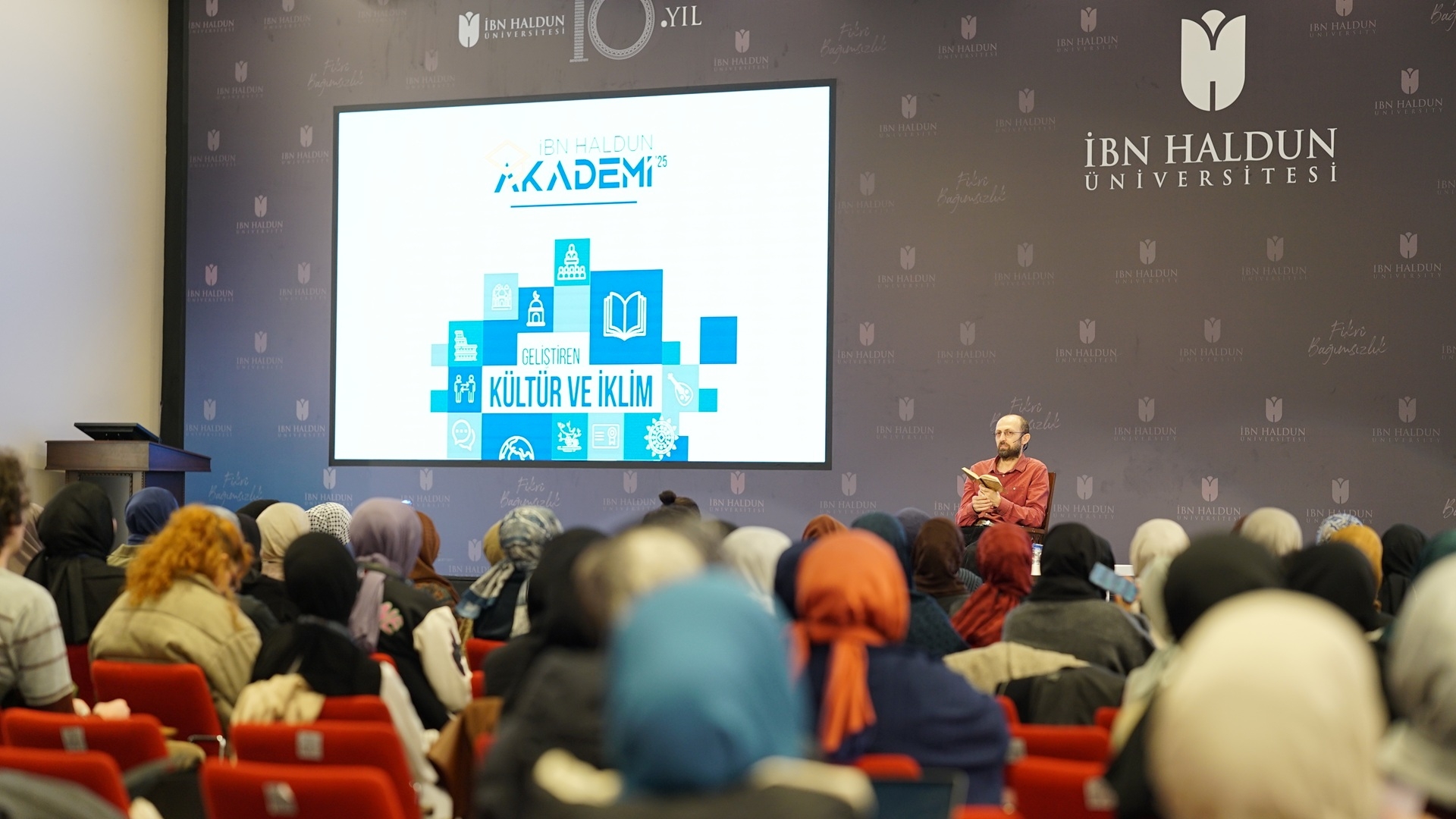


Ibn Haldun Academy '25 – “Developing Culture and Climate” program concluded on Saturday, April 26, 2025, with in-depth sessions on culture, society, and individual-collective creation processes. Participants were presented with a rich content ranging from vibrant cultural environments with examples from the West and Anatolia, the role of Turkish cinema in creating cultural climate, the adaptation of ancient cultures to the present day, to the coffeehouse culture of Istanbul as a communication environment where intellectuals meet.
The program, which allowed face-to-face participation from Istanbul and online participation from Anatolia, brought together Prof. Halil Berktay, Assoc. Prof. Enis Doko, filmmaker Murat Pay, and writer Cem Sökmen with university students and recent graduates this week.
Prof. Halil Berktay, Head of the History Department at Ibn Haldun University, in the second week of his seminar titled "Developing and Non-Developing, Conservative and Creative Cultural Environments," after last week's comparison of Ancient Greece's Athens and Sparta, this time focused on cultural climates that support creativity. Through examples such as the Bloomsbury Group, the Mavi Anadolucular (including Azra Erhat, Cevat Şakir Kabaağaçlı, and Sabahattin Eyüboğlu), and the Historians' Group of the Communist Party of Great Britain, he explained how free discussion environments nourish individual and collective creation processes. John Stuart Mill's thoughts on freedom and Ziya Pasha's saying "The spark of truth arises from the clash of ideas" were the main references of the session. In the context of the Mavi Anadolu movement from Türkiye, the balance between modernization and Anatolianism was questioned.
Assoc. Prof. Enis Doko, Head of the Philosophy Department at Ibn Haldun University, in the second week of his seminar titled "Cultural Climate and the Formation of Virtuous Societies," focused on Confucius' thoughts, Sufism, the Ahi order, virtue ethics, and the construction of cultural climate. Emphasizing the importance of "rituals in education and value transmission," Doko explained how "social roles" are shaped through aesthetics and tradition. Additionally, he discussed the applicability of the Ahi culture in the modern world and the potential of the concept of work ethics in creating cultural climate, based on the "Sufi tradition."
Director Murat Pay, in his conference titled "Turkish Cinema as a Cultural Warrior," examined the historical role of Turkish cinema in the context of cultural climate. He emphasized that Karagöz was an inspiration for Turkish cinema. He discussed the difference between "shadow" in Karagöz and "reality" in cinema. Pay also touched on significant milestones in the historical development of cinema, focusing on the evolution of Turkish cinema, especially after the 1950s. Drawing parallels between the Yeşilçam era and contemporary TV series productions, he explained both the interaction cinema establishes with the audience and its power in creating cultural atmosphere. Highlighting the capacity of cinema to "direct the gaze" and shape cultural memory, Pay pointed out that Yeşilçam and, in a broader perspective, the art of cinema create a bilateral cultural exchange ground. He emphasized that the orphanhood in our cultural and political journey led to Turkish cinema gaining a warrior identity. The conference, conducted interactively with experience sharing from the industry and lively discussion sections with Q&A, offered a vibrant discussion environment.
Writer and Kırklareli University faculty member Assist. Prof. Cem Sökmen, in his conference "Cultural Communication Venues of Istanbul from the Ottoman Empire to the Republic," focused on the transformation of Istanbul’s social spaces and explained the formation process of the coffeehouse and reading house (kıraathane/kahvehane) culture. He revealed how kahvehane since the 16th century and kıraathane in the 19th and 20th centuries became centers of socialization and cultural-intellectual production. Through examples such as Fevziye, Küllük, Marmara, Meserret, İkbal... he explained how these kıraathane/kahvehane provided a cultural climate for the intellectuals and writers of the period and the public who had the opportunity to meet them. He reminded that the rapid change of cities and venues, especially in our lands, has made urban history studies an important field.
The Ibn Haldun Academy '25 program will continue with new sessions on Saturday, May 3. Participants will have the opportunity to enrich their academic and intellectual accumulation and discuss their ideas through seminars and conferences addressing different dimensions of “Developing Culture and Climate”.